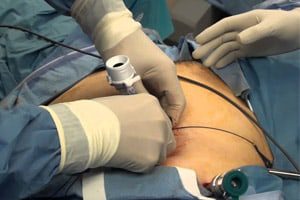
Twelve members of Congress have asked the Government Accountability Office (GAO) to investigate why a device used in gynecologic surgery was marketed for two decades before safety warnings were issued by the Food and Drug Administration (FDA). The power morcellator allows fibroid surgeries and hysterectomies to be done through small incisions rather than large abdominal […]

FDA Omits Serious Side Effects From Levaquin Label
Twelve members of Congress have asked the Government Accountability Office (GAO) to investigate why a device used in gynecologic surgery was marketed for two decades before safety warnings were issued by the Food and Drug Administration (FDA).
The power morcellator allows fibroid surgeries and hysterectomies to be done through small incisions rather than large abdominal incisions, but the device can also spread and worsen undetected uterine cancer, Philly.com reports.
The morcellator’s rapidly spinning blades cut bulky growths or the uterus itself into pieces that can be removed through tiny incisions. But dangerous cancers that cannot be detected prior to surgery can be spread in the woman’s abdomen and this significantly reduces a woman’s long-term chance of survival, according to the Wall Street Journal.
Dr. Amy Reed, an anesthesiologist, who experienced the spread of such a cancer, and her husband, heart surgeon Hooman Noorchashm, have been campaigning for a ban on the power morcellator. Reed has recently been treated for a second recurrence of uterine leiomyosarcoma, according to Philly.com.
Their couple’s campaign prompted an FDA review of the device. Last year the FDA warned of the power morcellator risk, using a new type of directive called “immediately in effect guidance.” Since the warning, hospitals and insurers have sharply curtailed use of the device and some manufacturers, including Johnson & Johnson’s Ethicon division, have taken the device off the market. The FDA said morcellators should be avoided in women who are at or near menopause or in patients whose tissue can be removed intact through the vagina or via a small abdominal incision. Morcellators should never be used, the FDA said, when the tissue is known or suspected to be cancerous.
The FDA estimates that up to one in 350 women undergoing hysterectomy might have a hidden cancer that could be spread by the morcellator. William Maisel, deputy director for science and chief scientist at the FDA’s Center for Devices and Radiological Health, said there is “no reliable way” to determine if a uterine fibroid is cancerous prior to removal. When the device came on the market in 1993, the risk was estimated to be one in 10,000, Philly.com reports. In their August 7 letter to the GAO, the members of Congress asked, “How did they get it so wrong for so long?” “We respectfully request that you investigate the root cause failure that ultimately led to the FDA’s black box warning on . . . morcellators in November 2014.”
Rep. Mike Fitzpatrick of Pennsylvania, lead signer of the letter, has joined Reed and Noorchashm in pushing for broad changes in the medical-device approval process. Rep. Louise Slaughter of New York and Rosa DeLauro of Connecticut are also among the letter’s signers. GAO spokesman Chuck Young said the GAO would decide whether to investigate based on factors including the availability of data, potential legal obstacles, and investigations that may be underway, Philly.com reports.


